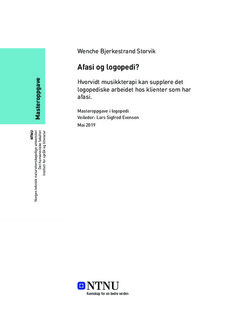| dc.contributor.advisor | Evensen, Lars Sigfred | |
| dc.contributor.author | Storvik, Wenche Bjerkestrand | |
| dc.date.accessioned | 2019-09-19T14:01:37Z | |
| dc.date.available | 2019-09-19T14:01:37Z | |
| dc.date.issued | 2019 | |
| dc.identifier.uri | http://hdl.handle.net/11250/2617793 | |
| dc.description.abstract | Jeg har valgt å skrive en studie om temaet musikkterapi i logopedisk arbeid med afasi.
Bakgrunn: Minst 5000 mennesker får afasi hvert år her i Norge. Afasi er et ord som ikke er
så kjent, og når en familie opplever at et familiemedlem får afasi er det sannsynligvis første
gang de hører ordet. Afasi er ervervede (ikke medfødte) språkvansker som oppstår etter en
skade i hjernen, og det innebærer som regel vansker med å snakke, forstå det andre sier, lese
og skrive. Som regel oppstår denne skaden i venstre hjernehalvdel, og den vanligste årsaken
er hjerneslag. Hjerneslag er en vanlig sykdom, spesielt hos eldre, og den omfatter både
hjerneblødning og blodpropp i hjernen. Antallet hjerneslag vil sannsynligvis øke de nærmeste
årene, fordi vi blir flere eldre i befolkningen.
Formål: Formålet med studien har vært å få innsikt i om hvorvidt musikkterapi kan brukes
som et supplement til det logopediske arbeidet hos klienter som har afasi. Studien kan være
nyttig for logopeder i deres praksis.
Problemstilling: Det overordnede temaet for studien er afasi og musikkterapi, og tittelen har
jeg valgt å la være like enkel; «Afasi og musikkterapi?» Problemstillingen er som følger:
Hvorvidt musikkterapi kan supplere det logopediske arbeidet hos klienter som har afasi.
Metode: Prosjektet er en litteraturstudie, der jeg har brukt forskning som allerede eksisterer
for å finne svar på problemstillingen. Studien har vist oppmerksomhet til forskning som
omhandler afasi hos voksne mennesker etter hjerneslag, og som i tillegg omhandler
musikkterapi eller lignende rehabilitering ved hjelp av musikk.
Resultat og konklusjon: Studien presenterer ulike evidensbaserte musikkterapeutiske
metoder og hvilken effekt musikkterapi har, eventuelt ikke har på klienter med afasi. Selv om
det er delte meninger om effekten og at det er vanskelig å få til homogene grupper i forhold til
forskning, så konkluderer likevel studien med at musikkterapi i betydelig grad kan supplere
det logopediske arbeidet hos klienter som har afasi.
Nøkkelord: Afasi, musikkterapi, musikterapi, Aphasia, music therapy. | |
| dc.description.abstract | I have chosen to write a study on the topic of music therapy in speech therapy with aphasia.
Background: In Norway more than 5000 people gets aphasia every year. Apashia is a word
which is not so familiar, and when a family experiences aphasia within the family it is most
likely the first time they hear the word. Apahsia is acquired (not innate) language difficulties
occurring after a brain injury, and it usually involves difficulties in speaking, understanding
what is said, reading and writing. Usually this injury occurs in the left hemisphere and the
most common cause is stroke. Stroke is a common disease, especially in older people,
including both cerebral haemorrhage and blood clots in the brain. The number of strokes is
likely to increase over the next years, because of the increase in the number of elderly.
Purpose: The purpose of the study has been to gain insight into whether music therapy can be
used as a supplement to the speech therapy of clients with aphasia. The study can be useful to
speech therapists in their practice.
Topic and research question: The main theme of the study is aphasia and music therapy,
and the title is chosen to be just as simple; “Aphasia and music therapy?” The problem is as
follows: Whether music therapy can supplement the speech therapy of clients with aphasia.
Method: The project is a literature study, where I have used already existing research to find
answers to the problem. The study has shown attention to research dealing with aphasia of
adults after a stroke, and which also deals with music therapy or similar rehabilitation using
music.
Result and conclusion: The study presents various evidence-based music therapeutic
methods and what effect music therapy has, or possibly does not have, on clients with
aphasia. Even if there are shared opinions on the effect and that is it difficult to obtain
homogeneous groups in relation to research, the study nevertheless concludes that music
therapy can significantly supplement the speech therapy of clients with aphasia.
Keywords: Aphasia, music therapy. | |
| dc.language | nob | |
| dc.publisher | NTNU | |
| dc.title | Afasi og logopedi? | |
| dc.type | Master thesis | |
